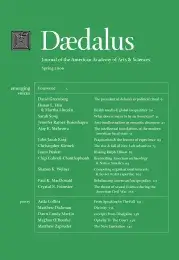Anti-intellectualism as romantic discourse
When I told friends that I was heading off to a doctoral program in U.S. intellectual history, they either seemed mystified–“Do we have an intellectual history?”–or found the entire proposition somewhat funny: “American intellectual history!? Isn’t that an oxymoron!?” More skepticism awaited as I began my studies. Classmates repeatedly subjected me to playful, if remorseless, interrogations about the wherefores and whithers of this so-called history of the American mind. I had to wonder what I was doing studying a subject that people think does not exist.
I might have dismissed this doubting American intellectual life as a curious national pastime until I experienced firsthand its transatlantic dimensions. While teaching an undergraduate course on “U.S. Intellectual History” as I was writing my doctoral thesis in Germany, I asked my students what drew them to a course on American thought. They confessed without a whiff of irony and no intended disrespect: they simply wanted to be in on the joke.
A curious thing happened as I got to know my students and they got to know American thinkers like Margaret Fuller, Herbert Croly, and Cornel West. I came to realize that my friends, classmates, and students hadn’t said anything about American culture that these very thinkers hadn’t said themselves. Just as West had lamented the “good American fashion” of fostering a “truncated perception of intellectual activity,” and Croly had likened the “American intellectual habit” to that of “domestic animals,” Fuller had warned about an America devoid of “intellectual dignity,” capable of only cultural “abortions,” “things with forms . . . but soulless, and therefore revolting.”1 Indeed our very own thinkers have argued for a specifically American version of the betrayal of the intellectuals: it is the intellectuals who have been betrayed by a culture hostile or indifferent to their ideas.
The vision of American history as one long durée of resistance to intellectual pursuits received its classic formulation in Richard Hofstadter’s 1963 study, Anti-Intellectualism in American Life. The suffocating political culture of the 1950s following Adlai Stevenson’s defeats confirmed Hofstadter’s view that “resentment and suspicion of the life of the mind and of those who are considered to represent it” had been a defining feature of American life. In Hofstadter’s text, “anti-intellectualism” takes on many guises: the disavowal of rationality and learning in early American Protestantism; impatience with abstract thought and preference for practical knowledge on the frontier, in business, and in progressive education; populist hostility to the elitism of genteel reformers, monastic academics, and policy experts. According to Hofstadter, though diverse, these sentiments in nineteenth- and early-twentieth-century American religious, political, and economic life shared a general disregard for intellect, making “anti-intellectualism” an axiomatic expression of the American experience.2
. . .
